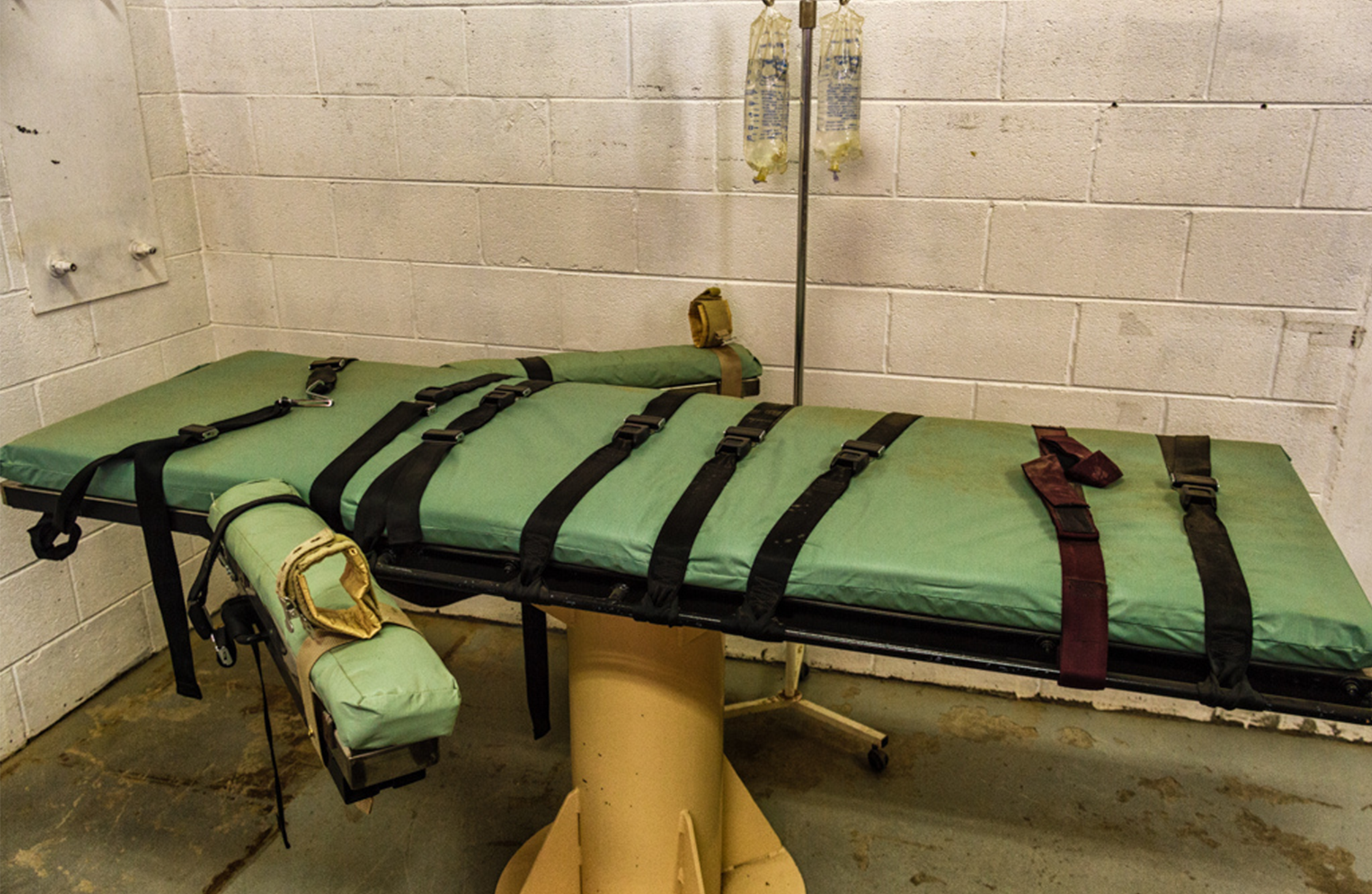On January 25, 2024, Kenneth Eugene Smith was suffocated by the State of Alabama until dead.
Euphemistically called ‘nitrogen hypoxia’, Smith was strapped to a gurney, a mask placed over his face, and forced to breathe pure nitrogen. The state claimed in a court filing that, although untested and never used for an execution, “nitrogen hypoxia is painless because it causes unconsciousness in seconds.”
But, as the AP reported, Smith convulsed and struggled for several minutes, spasming so violently that the gurney shook, followed by several minutes of gasping for air before he stopped breathing altogether. The process took at least 22 minutes.
“It was the most violent thing I’ve ever seen,” said Reverend Jeff Hood, who was in the death chamber as Smith died.
This was the second attempt to execute Smith. In 2022, on the same gurney, his botched execution was called off when, after several hours of stabs and cuts, the executioners failed to find a suitable vein to administer the lethal injection that he was scheduled to receive.
Kenneth Eugene Smith was not an innocent man. In 1988, he murdered Elizabeth Sennett for $1000. He was convicted in 1996 by a jury that voted 11 to 1 to sentence him to life in prison. The judge overruled the jury and sentenced him to death (which would not have been allowed under Alabama law today).
When I discuss my opposition to the death penalty, the heinousness of the crime is usually brought up as justification for the punishment. I know that evil exists in the world, and there are certainly crimes that turn my stomach and for which the criminal must be held accountable. My opposition to capital punishment doesn’t mean I think such terrible crimes are okay.
In a just society, the rule of law must be upheld in a way that deters crime and ensures our safety through fairness and accountability. By any objective measure, capital punishment is neither fair nor an effective deterrent.
As I wrote in April 2020, the South carries out over 80% of all executions in the United States, yet has the highest murder rate of any U.S. region. The Northeast, with less than 1% of executions, has the lowest murder rate. That doesn’t correlate with deterrence.
The death penalty is expensive, costing taxpayers three to eight times more than similar cases where capital punishment is not sought, even considering the cost of life imprisonment.
More importantly, the death penalty is not fair. Since 1973, more than 195 people have been released from death row with evidence of their innocence. How many more have been executed for crimes they did not commit?
So, if it is more expensive, ineffective as a deterrent, and risks executing innocent people, I can think of only one reason to call for the death penalty. Revenge.
But vengeance is not justice. If the law were merely to ensure equal punishment for a crime, it would be an eye for an eye, leading to a society in which everyone is blind. If you think a murderer should be killed because the punishment should match the crime, do you then believe a rapist should be raped? If so, by whom?
Violence in response to violence is not justice. Violence in response to a violent crime makes us no better than the criminal.
In an interview after being in the death chamber as Kenneth Smith was suffocated, Reverend Jeff Hood said, “The greatest evil of the death penalty is that it makes us all murderers.”
Referring to the story of the adulterous woman in the bible, Hood quoted Jesus as saying, “You who are without sin cast the first stone.”
“The death penalty is not about the person being executed. It’s about us,” Hood said. “We can call that person unrighteous all we want to. It’s not a question about the righteousness of the person being executed. It’s a question of whether or not we think we are righteous enough to kill someone.”
As Gwen Adshead wrote in The Guardian, “The job of the law is to prevent revenge, not enact it.”
In 2018, the Washington State Supreme Court ruled in State v. Gregory that the death penalty in our state is unconstitutional. Last year, Washington officially abolished the death penalty when Governor Inslee signed Senate Bill 5087 into law.
Twenty-nine states still allow the death penalty. The United States is one of the five countries with the highest number of executions, along with China, Iran, Saudi Arabia, and Egypt.
It is long past time to abolish the death penalty.
Execution is not justice.
Main Image: Lethal injection table / Ken Piorkowski, CC BY-SA 2.0
Note: Data is from deathpenaltyinfo.org unless otherwise indicated.
Other sources:
- apnews.com/article/alabama-execution-nitrogen-gas-5a96360ceddb8335c37cce608f815b30
- msn.com/en-us/news/us/alabama-man-shook-violently-on-gurney-during-first-ever-nitrogen-gas-execution/ar-BB1hhPTe
- slate.com/news-and-politics/2024/02/alabama-death-penalty-nitrogen-hypoxia-inside-kenny-smith-execution.html
- millerted.blogspot.com/2020/03/capital-punishment-is-never-justified.html
- theguardian.com/books/2022/aug/22/the-big-idea-should-revenge-ever-be-a-part-of-justice
- app.leg.wa.gov/billsummary?BillNumber=5087&Initiative=false&Year=2023#:~:text=Removing%20language%20from%20the%20Revised,of%20the%20Washington%20state%20Constitution
Ted Miller grew up around the world but now lives in Richland with his wife. He’s a runner, actor, singer, nuclear engineer, and graduate of the U.S. Naval Academy.
Ted believes that if more people worked toward love and understanding instead of giving in to fear and divisiveness, the world would be a better place. justicepeacelove.com


